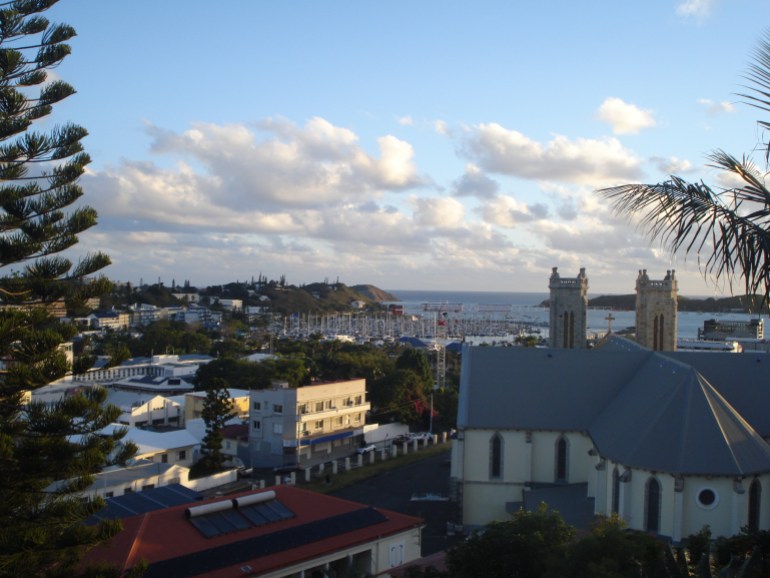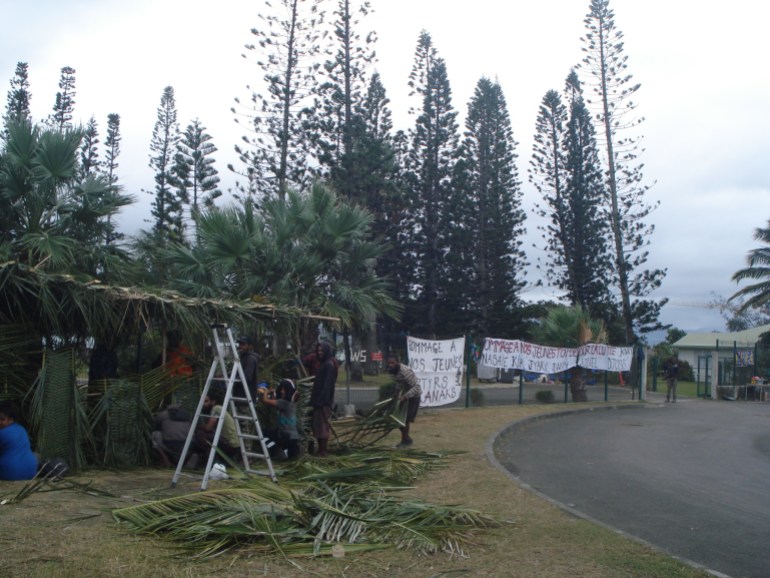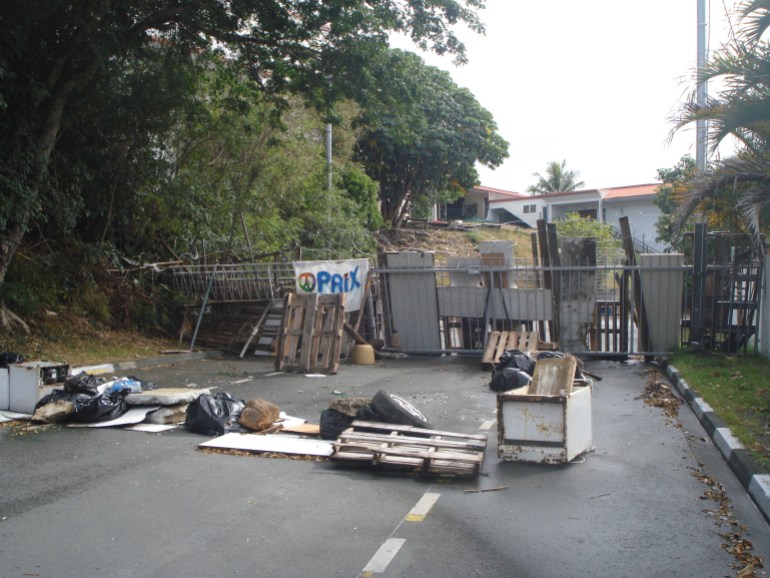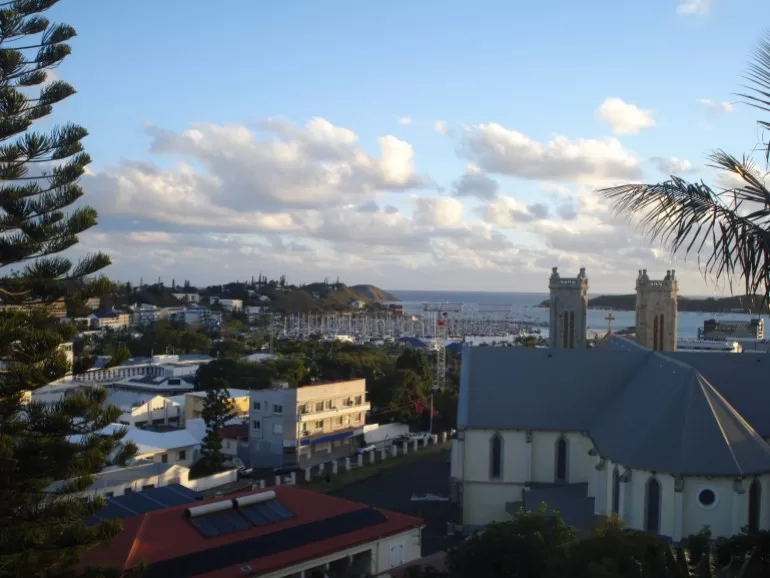Noumea, New Caledonia – The debris has been cleared from the streets of New Caledonia’s capital Noumea, but the shells of torched buildings are a continued reminder of the unrest that rocked the French territory in the Pacific nearly three months ago.
The May protests were sparked by Paris’s backing for electoral reforms in the territory that pro-independence supporters say would have diluted the Indigenous Kanak community’s influence at the ballot box.
But while that plan is now on the backburner, with the French government itself in flux following snap general elections this month, there is little sign that the political divisions it exposed have eased.
“It is very difficult for the Kanak people to live here. The French government still has a colonial strategy in New Caledonia and does not respect the political situation here,” Alain, a member of the Kanak and Socialist National Liberation Front (FLNKS) who preferred to be known by a pseudonym for security reasons, told Al Jazeera.
In mid-May, demonstrations by pro-independence supporters erupted across the islands in response to the reforms adopted by the National Assembly in Paris to expand New Caledonia’s electoral roll to include about 25,000 recent, mostly European, settlers. Police and activists fought in the streets of Noumea, and homes, as well as public and commercial buildings, were set alight.
New Caledonia’s pro-independence prime minister, Louis Mapou, called for an end to the unrest and for people to “use every way and means to bring back reason and calm”. Rioting ebbed after French President Emmanuel Macron agreed to suspend the reform bill on June 12, but the subsequent arrest and transfer of eight pro-independence leaders to jails in France further inflamed tension.
Many people are still in a state of shock after the crisis. Ten people were killed, tourists fled, and the loss and damage were estimated at more than $1bn, according to New Caledonia’s Chamber of Commerce. Thousands of people lost their jobs.

In some city suburbs, residents continue to maintain blockades on their streets.
In Magenta, the barricades are built from hastily collected materials, including barbed wire, wooden planks, furniture, and even refrigerators. Some are manned by community groups who sit beneath roadside tents and have assumed authority for controlling the traffic going in and out of the area. Their existence is a sign of how the sense of certainty and stability has been shattered for many people in the capital.
“I think that really what we lost is our hope, a vision of what can be in New Caledonia,” Catherine Ris, professor of economics and president of the University of New Caledonia, told Al Jazeera. Speaking of how people have lost livelihoods and incomes, she added: “We know that the consequences will be very deep in the next months. There will be a long-term impact of what has happened. There will be an increase in poverty around the city in the next weeks and months.”
Deep-seated grievances
For many Kanaks, who make up about 40 percent of New Caledonia’s population of about 290,000 people, peace will only be possible when their grievances have been addressed.
New Caledonia, a former French colony, is now an “overseas territory” with greater autonomy. In 1998, following conflict between pro-independence activists and French forces in the 1980s, political leaders agreed to the Noumea Accord, which provided for three referendums on independence and a restricted local electoral roll, which included Kanaks and only long-term immigrants.
In the first and second referendums in 2018 and 2020, 43.33 percent and 46.74 percent of voters backed independence. However, Kanaks boycotted the last vote in 2021, due to the pandemic, and the vote to remain part of France swung to 96.5 percent. “Because the Kanak people did not participate in the third referendum, we say it is invalid,” Alain emphasised.
The controversy renewed tensions between the independence and loyalist camps, and France’s unilateral move on electoral changes lit the powder keg of longstanding grievances.

By the side of a road on the outskirts of Noumea, islanders have set up a campaign site with flags and banners to draw public attention to their cause. A group of young people are building a temporary shelter from palm fronds and branches to hold meetings, and a young Kanak mother is coordinating activities while supervising her daughter’s homework. As local residents drive past, they wave and call out their support.
Kanak activists at the site told Al Jazeera they had joined May’s street demonstrations in anger over the lack of consultation over the reforms and their opposition to the changes, seen as the latest of a long line of injustices against the Indigenous community.
New Caledonia has vast resources of nickel and, at $35,745, one of the highest levels of gross domestic product (GDP) per capita in the Pacific Islands, but there are severe disparities between the Kanak and non-Kanak populations. The overall unemployment rate in the territory is about 11.2 percent, but among Kanaks, it is as much as 38 percent. Low education outcomes and joblessness are also acutely affecting younger Indigenous people and a high proportion of recent protesters on the streets were under the age of 25.
This month’s snap national election was an opportunity for Indigenous candidates to push for greater representation in Paris. Both incumbents were pro-France politicians, but while Nicolas Metzdorf of the loyalist anti-independence Generations NC party retained his seat in the first constituency, which includes Noumea, Kanak leader Emmanuel Tjibaou won the second constituency, which covers rural areas of the main Grande Terre island, with 57 percent of the vote. Tjibaou told local media that the election outcome was “proof that democracy is alive” in New Caledonia and urged a renewed commitment to dialogue by all political parties
New Caledonia was added to the United Nations’ decolonisation list in 1986, and for many Kanaks, the election result will bolster their political ambitions, which have the international support of other Pacific Island countries, the regional Melanesian Spearhead Group, Azerbaijan and Russia.
However, Marcieux, a Frenchman who migrated to New Caledonia about 30 years ago and declined to share his full name for reasons of privacy, questioned what independence would mean for people’s lives. “The problem is not independence, but what independence? It is easy to speak of independence, but, in reality, it is very difficult,” Marcieux told Al Jazeera in Noumea. He pointed out that France’s substantial funding of the territory’s government supported the economy and delivery of public services, but that could be jeopardised if ties were severed. “If there is no economy, you have nothing,” he said.

Despite the Pro-France independence referendum outcomes, French and New Caledonian political leaders will need to continue talks to decide future governance arrangements in the troubled territory. Blake Johnson, a senior analyst at the Australian Strategic Policy Institute in Canberra, said that France was unlikely to agree to independence soon.
“I would expect to see much of the same tensions and pushes for greater autonomy in the coming years unless another referendum on independence is agreed by the French Government,” he said.
For France, New Caledonia is a strategic asset, which gives it access to regional Pacific leadership forums. It is also an important military and maritime base and a vital part of France’s sizeable exclusive economic zone.
However, Alain stressed that the priority right now was to bridge the territory’s social and political divisions. “We must get back to the table to find an agreement for the smooth running of the country,” he said. Then, “all political forces and civil society must propose a way out [of the Noumea Accord] and find prospects for the country”.
It remains difficult to predict what will happen in the next few months. “Nobody is able to say today how this will all end up, or when,” Ris, the University of New Caledonia president, said. “We are really in a huge context of instability and uncertainty.”
